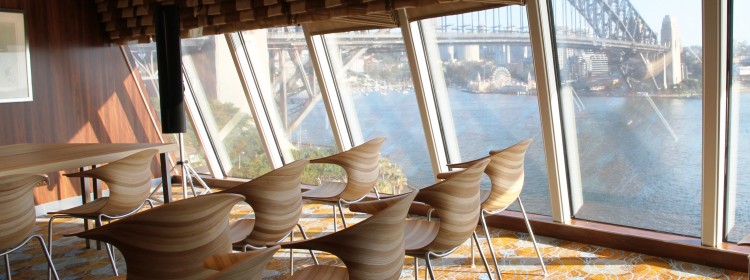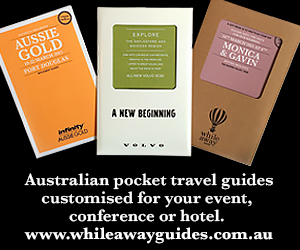The events-on-cruise-ships idea attests to the adage that there’s nothing new under the sun, and more shipboard meeting options are available than ever before. Yet it represents a market in Australasia with more potential than is currently being realised, The Siteseer recently discovered.
On a five-day voyage from Sydney to Hobart and back aboard the giant new, high-tech Ovation of the Seas, we made some interesting findings. Chief among them:
It’s fantastic value
The meetings-aboard offer is highly competitive. Delegates can meet, eat and have fun on the ship from the equivalent of around USD 200 per person per day.
As Ovation hotel director John Rae (pictured below) said in an interview with The Siteseer while at sea, “When you factor in the holiday aspect, depending on where you are, how long you’re on for and the ports you’ll be visiting, it’s tremendous value. Marvellous food and entertainment is laid on, and the entire program outside the actual meeting and event component is taken care of for you.”
 Value-for-money considerations span perks like group discounts and a points system that can earn groups onboard privileges.
Value-for-money considerations span perks like group discounts and a points system that can earn groups onboard privileges.
Moreover specialist staff aboard can arrange events specifically for each group, like private shore excursions, cocktail hours or other team-building exercises.
It’s as flexible as land-based options
A decade ago, Royal Caribbean International had half a dozen ships. Today it has 25 with five operating down under.
Ovation of the Seas itself is currently cruising a lengthy maiden southern summer season that’s expected to inject more than $35 million into the Australian national economy, according to Adam Armstrong, managing director for the company in Australia and New Zealand.
Events are now a major business for the company. Each ship has customisable venues to suit groups from 18 to 400 people in fit-for-purpose meetings facilities on board or, indeed, the entire ship if bookings are made well enough in advance.
But the run-of-the-ship theatres, lounges, and outdoor spaces can also accommodate groups as small as 25 and as large as 1,394 according to Adam.
Organisers can book a “neighbourhood” on the Oasis or Quantum Class vessels or an “evening reception under the stars” in the Solarium, an enclosed, glassed-in space on an upper deck.
 For example at the time of publication, Ovation was planning to host a fiftieth birthday celebration for 500 people for a bank when it arrived in Singapore, as well as a conference for travel company Expedia, also for 500.
For example at the time of publication, Ovation was planning to host a fiftieth birthday celebration for 500 people for a bank when it arrived in Singapore, as well as a conference for travel company Expedia, also for 500.
“What we have to do with groups this size is work around some of the bigger public venues on board,” he said.
This means hosting an awards ceremony in the big Royal Theatre or the “Two70,” the cavernous venue, which doubles as a fully equipped theatre for big stage shows, at the stern.
Meantime the dedicated conference facilities on Ovation can be split into four rooms, so organisers could arrange a plenary session with two breakout rooms off it, for instance.
“In Hong Kong and China we recently had famous singers coming on to do a cabaret act as part of a client’s event,” said John. “And we run charters too.”
CruiseCo, a consortium of cruise travel specialists, organises a range of musical charters including Rock the Boat, Cruise Country and Bravo (musical theatre) annually on Royal Caribbean ships in Australasia, with musicians playing in all venues and appropriately themed events for the duration of the trip. “These are some of the best cruises I’ve done,” says John. “Everyone’s there for the same reason, and the atmosphere is great.”
The food is first-class
Flexibility extends to a plethora of dining options. According to group coordinator on Ovation of the Seas Marla Baybay (pictured below), depending on the guests and the part of the world in which the voyages are taking place, chefs on board can produce specific menus for groups, and arrange halal and kosher meals as well.
These meal requests must be made well in advance so the ship has enough stock and can deliver group expectations.
 The scale of the restaurant operations is astonishing. Restaurant Operations Manager on Ovation of the Seas Koksal Merdamert (pictured below right, with head chef Sebastian Holda), oversees the serving of around 20,000 meals a day to 4,900 passengers and 1,500 crew.
The scale of the restaurant operations is astonishing. Restaurant Operations Manager on Ovation of the Seas Koksal Merdamert (pictured below right, with head chef Sebastian Holda), oversees the serving of around 20,000 meals a day to 4,900 passengers and 1,500 crew.
On a typical seven-day cruise, travellers will consume 3,300 kilos of chicken, 3,750 dozen eggs, 5,100 kilos of beef and 1,700 kilos of french fries.
There are 18 dining options aboard, Koksal said, including Jamie Oliver’s first Australian restaurant at sea, Jamie’s Italian, Chops Grille steakhouse and an Izumi Japanese.
In some eateries like these, the ship charges guests an additional fee. One such venue is the quirky restaurant known as Wonderland, with design themes that resonate with Lewis Carroll’s famous book. The eclectic menu here when we were aboard included “oceanic citrus,” crispy crab cones, duck-liver fritters, “vanishing noodles,” “liquid lobster” (bone marrow and caviar) and eggs in blue cheese and hot sauce.
It’s notable, however, that the other non-chargeable dining options also serve outstanding, classy meals at breakfast, lunch and dinner – from the white-linen and silver-service-type venues such as Silk, American Icon Grill and Windjammer Marketplace – a vast foodcourt.
 To run them all efficiently, Koksal and his teams must plan menus up to a year in advance. Wherever possible, the ship’s provisioners order fresh local produce from the ports they visit, and adjust menus in line with guests’ feedback, he said.
To run them all efficiently, Koksal and his teams must plan menus up to a year in advance. Wherever possible, the ship’s provisioners order fresh local produce from the ports they visit, and adjust menus in line with guests’ feedback, he said.
“We obviously tailor menus according to which part of the world we’re cruising in,” Koksal said.
“In Asia we’ll serve proportionately more items that suit local tastes like dumplings, noodles and congee. If we can’t serve something that’s on the menu, like New York steak say, we’ll replace it with something even better, perhaps rack of lamb.”
As The Siteseer discovered, events organisers shouldn’t swallow whole the vast majority of complaints about the food, or ship, made on online forums about any vessel. For some reason cruise ships attract a selection of whingers. (“It’s not as good as previous times,” “we had to wait twenty minutes” and so forth. Which begs the question, why do you keep returning? ).
The ships are enticing destinations themselves
Ovation of the Seas claims to be the newest, biggest, most technologically advanced cruise liner to sail in Australasia. This becomes obvious from the moment you check in before boarding when a smiling staffer check your details and asks you to sign you name on a iPad until the time you disembark with an electronic beep scanning your personal cruise card.
“It’s a game-changer for cruising down under,” said Adam Armstrong, managing director Australia and New Zealand.
 Added John Rae: “I’ve worked for Royal Caribbean since 9/11 and it’s a phenomenally dynamic work environment, and Ovation is, without doubt, technologically and in its design, in every way, far ahead of everything else.”
Added John Rae: “I’ve worked for Royal Caribbean since 9/11 and it’s a phenomenally dynamic work environment, and Ovation is, without doubt, technologically and in its design, in every way, far ahead of everything else.”
At 348 metres long, 18 decks high and weighing 168,666 tons, it’s the fourth-largest cruise ship in the world, with theatre shows, comedy and quiz gig, live bands, plus some genuinely new and gee-whizzey features.
These include North Star, an air-conditioned passenger pod at the end of a hydraulic boom that hoists people about a hundred metres into the air above the ship (we enjoyed this greatly, on a blustery day), and iFly, a vertical wind tunnel in which a powerful fan allows more intrepid guests to simulate free-falling from an aircraft.
Plus there’s a well-equipped gym, vertical climbing wall for mountaineering fans and bumper cars, just like you’d find at a fairground.
Given all these attractions, it’s not surprising that many groups will hold intensive meetings on the first three days of a voyage, then let their people relax and enjoy the trip afterwards, said Marla Baybay.
The business is booming, everywhere
Raw data speaks for itself. There are more and more ships down under, and Australasian seasons are generally getting longer, moving beyond the peak periods of school holidays.
 The Cruise Lines International Association (CLIA) has revealed that global cruise travel – leisure and group – is continuing to grow and evolve at a record pace. Some 24.2 million people cruised in 2016, a million more than the previous year and almost two million more than the year before that.
The Cruise Lines International Association (CLIA) has revealed that global cruise travel – leisure and group – is continuing to grow and evolve at a record pace. Some 24.2 million people cruised in 2016, a million more than the previous year and almost two million more than the year before that.
“Our meetings and events business afloat changes from market to market, the time of year and the types of group and event we’re hosting, but there’s absolutely no doubt it’s growing,” said John Rae.
It’s “greener” than you may think
As CSR is increasingly important to planners and delegates, it’s notable that the Ovation is flagged by its marketers as one of the “greenest” ships afloat.
For instance it’s equipped with air lubrication systems on the hull to reduce fuel consumption, and Royal Caribbean has removed all incandescent lights; much of the lighting on board is operated by motion sensors.
“We recycle, separate and actually earn money from recycled glass and paper at the ports we visit, with the proceeds shared among the crew,” said Koksal Merdamert. “We adhere to all relevant marine waste standards.”
What makes a group? Eight staterooms or more. Other than that, there are no requirements. You can book a group cruise for weddings, vow renewals, anniversaries, family and class reunions, church retreats and birthdays. To find out more or book, go here or visit the Royal Caribbean International site.
Book well in advance for best results, say these incentive guests
What do people who’ve actually held meetings on this ship say? The Siteseer spoke to Rechelle Dare and Tina Pizzoni (pictured below), Gold Coast- and Brisbane-based managers respectively for helloworld travel. They were on an incentive trip for 14 people from various agencies.
We’ve found the level of support and service terrific. We’re here as recognition for being top achievers in our company. The ship’s people including a maitre ‘d gave us a heads-up about the things we can tell our clients, plus we’ve had a tour of the galley and back stage at the theatre. Fascinating.
We’ve liked the conference facilities where we’ve been holding our more formal meetings at the rear of the ship. We’ve also had a special function in one of the bars [Vintages] which was set aside for us especially. I think the idea of conferences and incentives at sea is fantastic. It’s easier to plan, and you can do as much as you want to or not.
One issue for large groups is that you must book well in advance, so securing space early is key. The conference facilities on board aren’t big enough for really large groups, so you’d need to look at reserving one of the theatres. We’ve been involved in one event afloat where we took up a lot of the ship; we were about 500 strong.
We’ve loved it, eaten wonderful food and had a great time.





